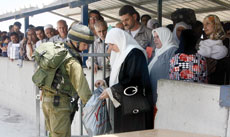RAMALLAH, West Bank, 8 August 2007 — Aides to Israeli President Shimon Peres confirmed yesterday a report that Prime Minister Ehud Olmert is examining a new framework for peace, in which Israel will propose transferring to the Palestinian state areas equivalent to 100 percent of the territories conquered in the 1967 war.
Peres aides said in response to the report of Israeli daily Haaretz that the proposal was formulated while Peres was vice premier, and presented to Olmert a few days after he entered the president’s residence.
Olmert’s office, however, denied the existence of the proposal yesterday. “We do not know of any plan as described in the (Haaretz) article,” the prime minister’s office said in a press statement. “We would like to clarify that such a plan has not been considered, nor is it being raised for discussion in any forum.”
According to Haaretz, the proposal includes a timetable for negotiations for the final status agreement and implementing it, similar to the framework of the Peres-Abu Ala agreement reached at the end of 2001.
Israel will suggest to the Palestinians to conduct negotiations for adequate territorial compensation from Israel’s sovereign territory, in exchange for settlement blocs amounting to about five percent of the West Bank’s area.
Israel is also examining various options of exchanging settlement blocs with Arab community blocs within Israel, in agreement with the residents. An agreement on this issue would enable the right-wing party Yisrael Beiteinu, headed by the hawkish Avigdor Lieberman, to remain in the Israeli coalition.
Olmert has not yet decided on his position regarding all the plan’s clauses, but apparently has not dismissed its main ideas.
Olmert and Palestinian President Mahmoud Abbas agreed Monday that cooperation between Israel and the Palestinian Authority would be expanded, in an effort to expedite progress in their talks for the establishment of the Palestinian state.
In another development, The Hamas movement yesterday denied renewing negotiations with Israel over the release of Israeli soldier Gilad Shalit, captured by Palestinian armed groups in June 2006. Osama Mzzaini from Hamas said that “for three months there has been no contact, mediation or talks either from the Egyptian delegation or any other mediator, since the Egyptian delegation left the Gaza Strip on June 14. There has been no word since Israel retracted the conditions of the deal which were accepted months ago.”
Meanwhile, Israeli police, using sledge hammers, chain saws and power clippers, stormed a building in the West Bank town of Hebron early yesterday and dragged out hundreds of settlers who had holed up there illegally, hoping to expand the Jewish presence in the volatile biblical city.
Settlers spit and hurled stones, water, oil and concrete powder as police, backed by army troops, broke through fortified doors and carried out the squatters one by one. Three settlers sealed themselves inside a concrete bunker built for the standoff.
The operation yesterday followed the highly publicized refusal of several Orthodox Israeli infantry soldiers to take part in the evacuation. The army sentenced a dozen soldiers, including two commanders, to brief jail terms for the rebellion.
Hebron, a frequent flash point of tensions between Israelis and Palestinians, is home to about 500 religious Jewish settlers living in heavily guarded enclaves.
In another development, a rocket fired at Israel by Palestinian fighters yesterday fell short and killed two Palestinian children in the Gaza Strip, ambulance crews said.
No group claimed responsibility for launching the rocket, which the medical workers said landed near the northern Gaza town of Beit Lahiya, killing a seven-year-old boy and his sister, aged nine.
Ehab Al-Ghsain, spokesman for the Hamas-run Ministry of Interior in Gaza, said an investigation into the circumstances of the children’s deaths was under way.
“We have yet to determine how it happened but we stress our support for resistance,” Ghsain said, referring to armed confrontation with Israel.
— With input from agencies









